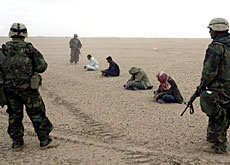ICRC restores family links in Iraq

The International Committee of the Red Cross (ICRC) is helping to put Iraqi families in touch with missing relatives through a new tracing agency.
The Geneva-based centre is also forwarding information from Iraqi detainees captured by United States-led forces in the country.
The crisis unit, established at the end of March, has already processed thousands of registration cards from Iraqi prisoners of war (PoWs), along with “safe and well” messages from civilians, who are anxious to let their relatives know they are alive.
The head of the agency, Pierre Barras, says the messages play a vital role in alleviating the emotional suffering and anxiety of victims of conflict and their families.
“For the families, the messages are very important because it’s one thing to be physically well… but there’s also the psychological wellbeing of the individuals involved,” he told swissinfo.
“It’s a relief for families to receive news from their loved ones.”
Communication void
The coalition bombing raids and the breakdown of telephone, television and transport services have left millions of Iraqis without a means of contacting friends and relatives, both within Iraq and abroad.
Barras says the ICRC set up the family links centre and a related website in order to respond to this communication void.
The unit, located at the ICRC’s training site near Geneva, is made up of more than 50 people, including English and Arabic translators, data entry operators and specialists in detention-related and tracing activities.
Capture cards
Every day, the staff sort through hundreds of red and white “capture” cards, which have been filled out in Arabic by Iraqi PoWs and handed over to ICRC field delegates.
The Geneva Conventions, which outline the rules of war, empower the ICRC to visit detainees and monitor their treatment.
“The cards tend to be very well filled out, because the more they write, the more the prisoners feel that they are safe and accounted for,” said Barras.
He added that the information on each card was thoroughly checked by coalition representatives to ensure that none of the detainees – who may remain loyal to Saddam Hussein – are able to send out covert messages.
Rewarding
Over the past few weeks, the agency has also received hundreds of “safe and well” messages from Iraqi civilians who made their way to ICRC offices in Iraq.
The information is faxed on to the Geneva unit, where the messages are logged into the ICRC’s database. An Arabic speaking staff member then tries to contact the sender’s relatives – wherever they are in the world – to pass on the news.
ICRC translator, Nadine Omar, says the process of contacting the families is not only useful but also rewarding.
“When we call them up, they’re very happy to know that their family members are in good health and good shape, [as] they were very worried about them,” she told swissinfo.
Worldwide effort
According to Barras, the international network of Red Cross and Red Crescent Societies has also been instrumental in forwarding messages around the world.
From Baghdad to Vancouver, thousands of people have sought help from the aid organisation’s local representatives in locating their siblings, parents and cousins, he says.
So far, the ICRC has only been able to get messages out of Iraq but Barras says they hope to forward information to civilians inside the country soon.
In the meantime, they have created a website in English and Arabic, which is designed to help separated relatives find one another.
Over 5,000 people have used the site to register themselves or their relatives and the ICRC says it receives an average of 400 requests a day for information concerning lost and separated relatives.
swissinfo, Anna Nelson in Geneva
The International Committee of the Red Cross has set up a tracing agency to help separated Iraqis find each other.
The special unit, located outside of Geneva, is made up of over 50 Arabic and English speaking translators, data entry operators and staff specialised in tracing activities.
The tracing agency is responsible for processing thousands of registration cards filled out by Iraqi detainees held by coalition forces, as well as hundreds of “safe and well” messages from civilians.

In compliance with the JTI standards
More: SWI swissinfo.ch certified by the Journalism Trust Initiative











You can find an overview of ongoing debates with our journalists here . Please join us!
If you want to start a conversation about a topic raised in this article or want to report factual errors, email us at english@swissinfo.ch.